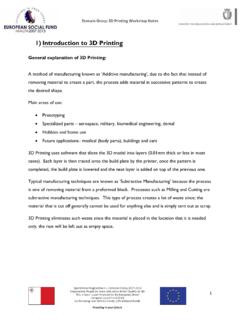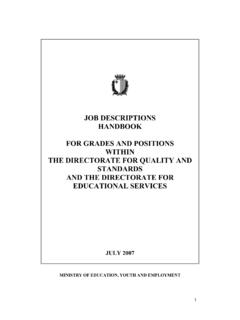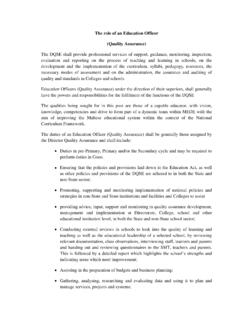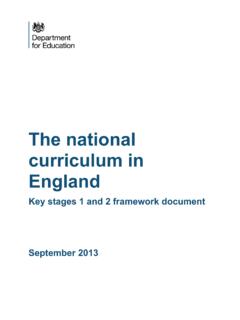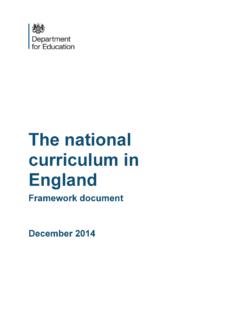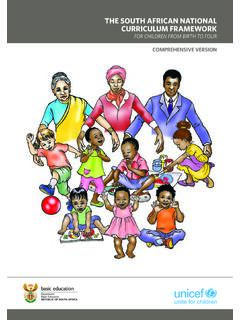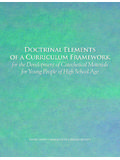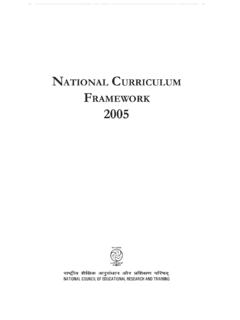Transcription of A National Curriculum Framework for All - Education
1 A National Curriculum Framework for All 2012. Ministry of Education and Employment The cover illustrates the heart of the National Curriculum Framework which is the classroom set-up, in which the teacher is given the latest technology to facilitate learning in an environment that captures diversity and inclusivity and leads students to work towards personal growth, an understanding of the values of solidarity and social justice, formal qualifications and employability. Picture taken by Roberto Runza A National Curriculum Framework for All Ministry of Education and Employment December 2012.
2 A document prepared by the Ministry of Education and Employment. It is available on the Ministry of Education and Employment website: The contents of this publication may be reproduced in part, except for commercial purposes, provided that the extract is preceded by a complete reference to the Ministry of Education and Employment followed by the date of publication of the report. Copyright: Ministry of Education and Employment December 2012. Design & Print: Salesian Press - Malta ISBN: 978-99957-0-409-4. THE National Curriculum Framework IS: a reference for action based on general consensus and the contribution of stakeholders as well as those committed to its implementation.
3 A living Framework , in such a way that allows for adjustments to new developments during implementation;. a policy instrument as well as information on the implementation strategy, actions and benchmarks for implementation, monitoring and evaluation;. a response to the changing demands of individuals and society, rapid changes in our Education system driven by globalisation, ICT development, competition, shift of traditional values and new paradigms. THE National Curriculum Framework AIMS AT: 1. encouraging children and young people and teachers to work together and learn from each other.
4 2. sustaining individual attention, so that all children fulfill their capacity. 3. supporting schools to fulfill the expectations of children and their parents. 4. providing quality time for social interaction, non-formal learning and peer activity. 5. directing Education leaders to rationalise the content of Learning Programmes so as to ensure quality and not magnitude. 6. ensuring that, in the context of the holistic entitlement of the Learning Areas, young people in compulsory Education have as an indispensible prerequisite mastery in Maltese and English, Mathematics, a Science subject and Digital Literacy.
5 7. helping children to regard social justice and solidarity as key values in the development of the Maltese society. 8. empowering parents and young people to work towards the acquisition of a formal qualification in key competences as the foundation for Lifelong Learning. 9. supporting Education leaders to successfully implement the NCF and systematically monitor its development at classroom level so that National targets are achieved within established timeframes. 10. requesting teachers to regard children as Malta's future workforce and therefore ensure that positive attitudes towards excellence, commitment, responsibility, flexibility and entrepreneurship form part of the learning process.
6 Iii CONTENTS. Message from the Hon Dolores Cristina, Minister Education and Employment vii Learning Together, Inspiring Success ix Message from the President of the Malta Union of Teachers xi Executive Summary xiii Review of the National Curriculum Framework and Way Forward 1. 01. Review of the National Curriculum Framework following the Consultation Process 3. A Sustained Process of National Consultation 3. Position of the Working Group after Analysis of the Feedback Received 4. A Framework for the National Curriculum 4. The Principles and Aims of the New National Curriculum Framework 5.
7 The Learning Areas 8. The Cross Curricular Themes 9. Assuring that Every Learner Makes a Successful Transition Across the Education Cycles 10. Aligning Learning and Assessments to Learning Outcomes 11. Aligning Learning Outcomes with the Level Descriptors of the Malta's Qualifications Framework 12. Key Competencies, Employability and Mobility 13. Monitoring and Benchmarking the Performance of the Education System 14. The Cycles of Education 15. Entitlement 17. Professional Development of Teachers 18. Securing Seamless Transition between the Secondary Cycle for Education and Post-Secondary Education 19.
8 02. Outcomes and Outputs of the National Curriculum and its Implementation 21. Outcomes and Outputs of the National Curriculum Framework 21. Implementing the National Curriculum Framework 25. The National Curriculum Framework 29. 03. Main Tenets of the NCF 31. Components of the National Curriculum Framework 31. General Principles 32. Aims of Education 32. Learning Areas and Cross Curricular Themes 33. Effective Learning and Teaching 39. Assessment and Evaluation 41. Parental and community involvement 43. Support Structures 43.
9 Iv The Early Years (KG 1 Year 2) 45. Purposes and general objectives 45. The Junior Years (Years 3-6) 50. Introduction 50. Aims of the Junior Years Cycle 51. The Secondary Years (Years 7 11) 58. Introduction 58. Aims for Secondary Education 58. References & Appendices 69. References 71. Appendix I: The Terms of Reference of the Post-Consultation Working Group on the National Curriculum Framework 72. Appendix II: The Constitution of the Working Group on the Post-Consultation National Curriculum Framework 73. Appendix III: The Level Descriptors of the Malta Qualifications Framework for Lifelong Learning 74.
10 Figures Figure 01: Relationship between Learning Outcomes, Programmes of Learning and Assessment, and Examinations 12. Figure 02: Monitoring and Benchmarking the Education System 14. Figure 03: The Learning Areas and the Cross-Curricular Themes in the NCF 39. Tables Table 1 : Outcomes of Education 2012 and Targets Set for 2027 24. Table 2 : NCF Implementation Strategy 26. Table 3 : Outcomes of Education 2012 and Targets Set for 2027 67. v Message from Hon Dolores Cristina Minister of Education and Employment The National Curriculum Framework (NCF) is the Through this NCF a number of ambitious but result of a long, nationwide consultation process.




